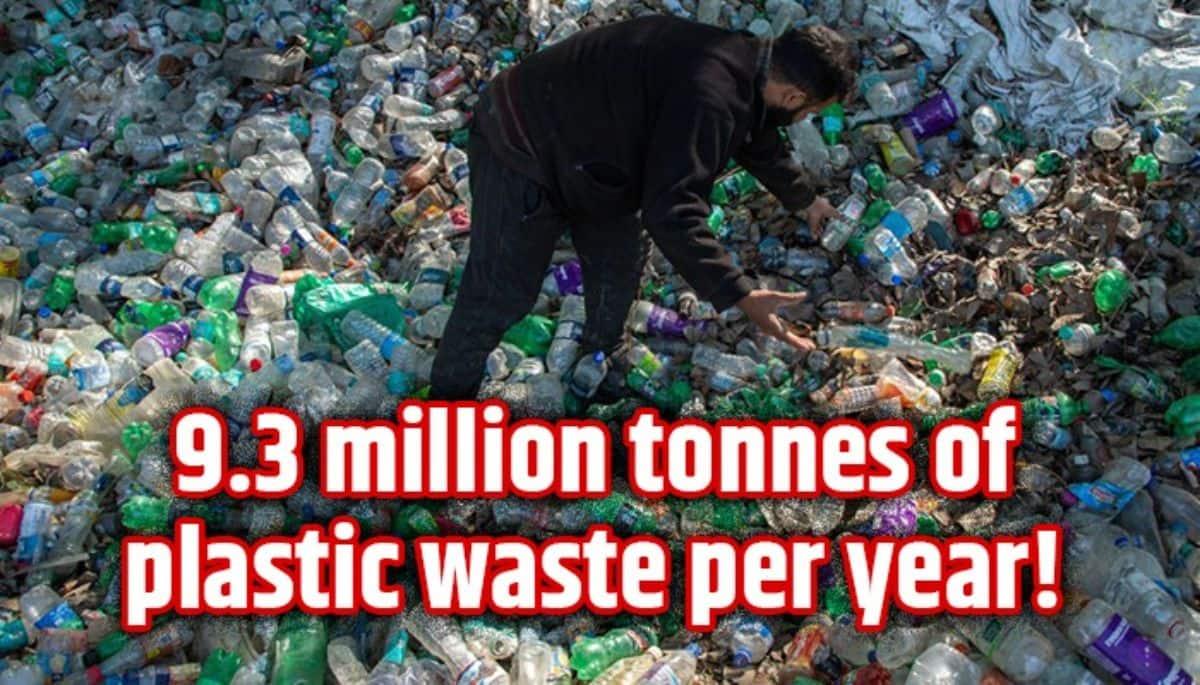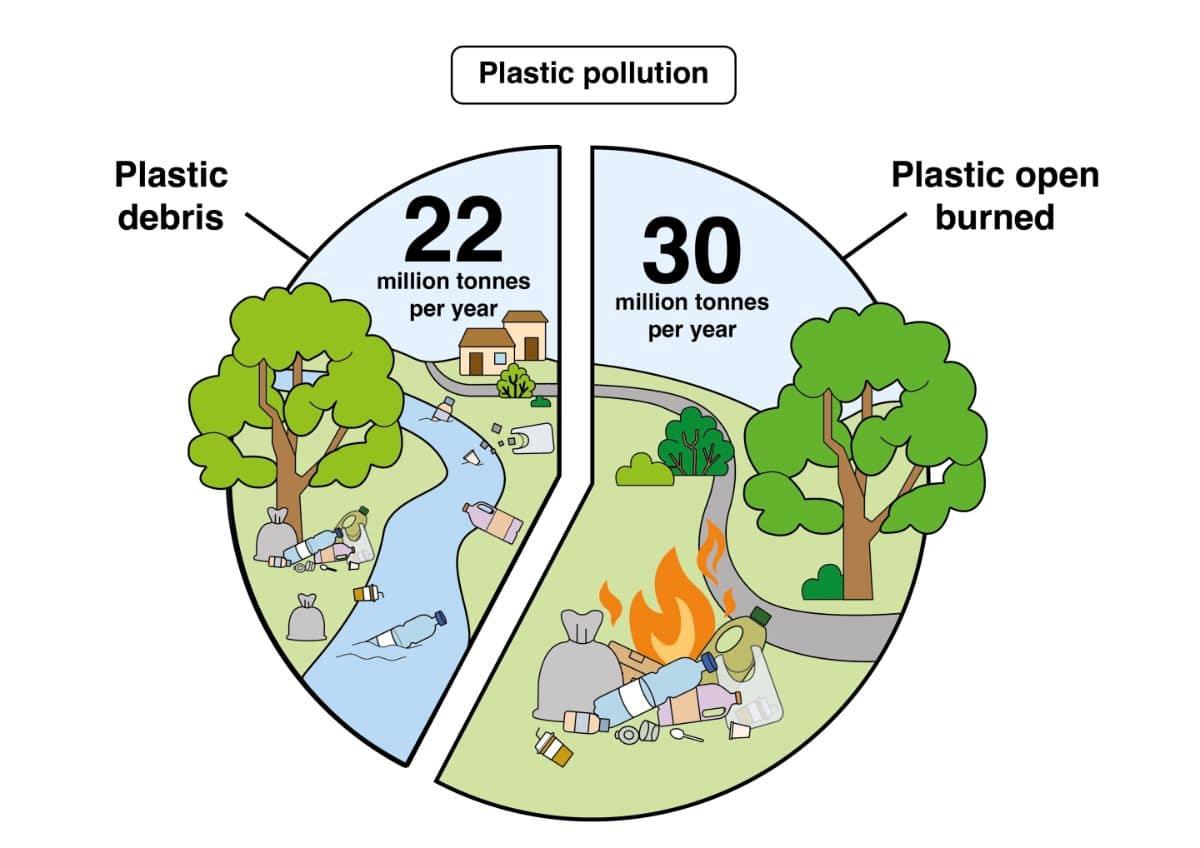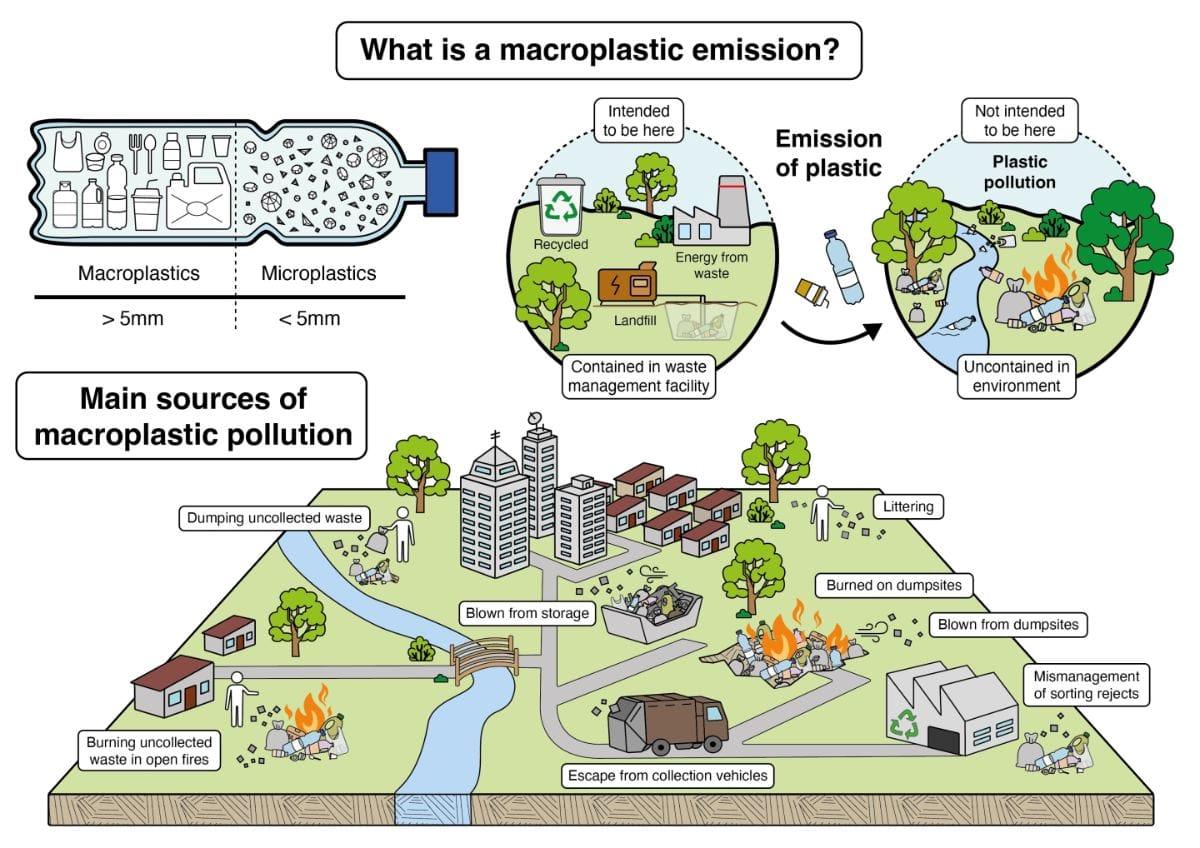
ALARMING! India Is World's Largest Plastic Polluter, Reveals Study; 9.3 Mn Tonnes Of Waste Generated In 2020
52 million tonnes of plastic uncollected in 2020
According to the study, 52 million tonnes of uncollected plastic waste were released into the environment in 2020, significantly raising health concerns for the affected populations. Dr. Costas Velis, the lead author of the study, emphasized the severity of the issue:“This is an urgent global human health issue-an ongoing crisis: people whose waste is not collected have no option but to dump or burn it.”
AI-powered modelling, based on data from 500 cities across 127 countries, allowed researchers to predict annual waste production and track the fate of plastic. Globally, more than 400 million tonnes of plastic are produced every year, and approximately 52 million tonnes of it are either burned or dumped openly, contributing to environmental degradation and severe health risks.
(Infographic Credit: Dr. Angeliki Savvantoglou of Bear Bones)
India: The world's biggest plastic polluter
Contrary to earlier studies that identified China as the leading contributor to global plastic pollution, the latest findings revealed that India is now the top polluter. In 2020, India generated 9.3 million tonnes of plastic waste, accounting for nearly a fifth of the world's uncollected plastic. This situation is exacerbated by the country's massive population of 1.4 billion and poor waste collection infrastructure.
India's plastic waste output exceeds that of Nigeria and Indonesia, the second and third largest polluters, respectively. Nigeria produced 3.5 million tonnes of plastic waste, closely followed by Indonesia with 3.4 million tonnes. China, once the world's largest polluter, has improved its waste collection and processing systems, dropping to fourth place with 2.8 million tonnes.
High plastic production in Sub-Saharan Africa
The report also highlights significant concerns in sub-Saharan Africa. Despite producing less plastic overall compared to larger nations, countries in this region generate a disproportionately high amount of plastic waste per capita. For example, the Democratic Republic of the Congo was ranked as the tenth biggest producer of plastic waste in 2020, contributing one million tonnes. Sub-Saharan Africa averaged 12 kilograms of plastic pollution per person in 2020, the equivalent of 400 plastic bottles per person annually.
In comparison, the UK, which ranked 135th in the study, produces just three plastic bottles worth of pollution per person each year, generating only 4,000 tonnes of plastic waste annually. The US, though more significant in plastic production, ranked 90th, with 47,649 tonnes of waste per year-over 10 times more than the UK.
(Infographic Credit: Dr. Angeliki Savvantoglou of Bear Bones)
Burning of plastic waste: A serial killer
One of the most alarming findings from the study is the prevalence of open burning of plastic waste in countries lacking proper waste collection. In 2020, over half of the world's uncollected waste-30 million tonnes-was burned without environmental controls, releasing harmful toxins into the air.
Dr. Velis noted the devastating effects of this practice,
“Setting the plastics on fire may seem to make them 'disappear,' but the open burning of plastic waste leads to substantial human health damage, including neurodevelopmental, reproductive, and birth defects, as well as widespread environmental pollution.”
Communities in poorer countries, which lack access to safe disposal methods, are the most affected by these toxic emissions. The study estimates that 15% of the world's population-roughly one billion people-live without waste collection services, leaving them vulnerable to the health risks posed by plastic pollution.
Waste exports and global inequities
The researchers also highlighted the ethical concerns surrounding the export of waste from richer countries to poorer nations. Although it is illegal in the UK to export waste for anything other than recycling, investigations have shown British waste being dumped illegally on roadsides in Turkey and in landfills in Indonesia. This global inequality worsens the pollution crisis, as poorer nations are left to manage waste from wealthier countries without adequate facilities.
Dr. Josh Cottom, a co-author of the study, stressed the importance of addressing this crisis, "The health risks resulting from plastic pollution affect some of the world's poorest communities, who are powerless to do anything about it. By improving basic solid waste management, we can both massively reduce plastic pollution and improve the lives of billions.”
(Infographic Credit: Dr. Angeliki Savvantoglou of Bear Bones)
The study underscores the urgent need for global cooperation to address the plastic waste crisis. While developed nations, such as those in Europe and the US, produce significant amounts of plastic, they tend to manage it more effectively through better collection and processing systems. However, the research emphasizes that wealthier countries must take responsibility for the waste they generate and ensure that it is not offloaded onto poorer nations without the capacity to handle it.
Improving solid waste management in developing countries, increasing investment in recycling infrastructure, and enforcing stricter regulations on waste exports are critical steps needed to combat the growing plastic pollution problem. Without such measures, millions of lives remain at risk, and the environmental impact of plastic waste will continue to worsen.
Which countries produce the most plastic waste?
778,932 Mexico: 767,447 Vietnam: 754,959 Myanmar: 725,433 Ethiopia: 651,876 Uganda: 617,565 South Africa: 609,757 Kenya: 602,475 Iran: 560,725 Angola: 550,441 Sudan: 529,961 Turkey: 486,398 Afghanistan: 457,234 Cameroon: 432,957 Ukraine: 417,655 Cambodia: 413,564 Uzbekistan: 395,211 Côte d'Ivoire: 394,834 Ghana: 385,727 Morocco: 385,558 Algeria: 379,622 Argentina: 350,880 North Korea: 344,633 Syria: 328,329 Yemen: 327,239 Mozambique: 323,380 Sri Lanka: 273,779 Peru: 270,769 Guatemala: 263,614 Venezuela: 249,864 Nepal: 238,989 Kazakhstan: 238,988 Haiti: 229,493 Somalia: 225,305 South Sudan: 215,243 Zambia: 215,139 Senegal: 214,610 Chad: 211,833 Mali: 205,639 Rwanda: 201,068 Malaysia: 197,552 Madagascar: 190,784 Burkina Faso: 185,331 Malawi: 171,474 Benin: 168,522 Zimbabwe: 162,871 Tajikistan: 156,028 Paraguay: 154,547 Colombia: 153,451 Burundi: 145,231 Romania: 141,944 Tunisia: 129,723 Papua New Guinea: 129,684 Laos: 127,090 Honduras: 126,403 Serbia: 126,143 Jordan: 124,391 Niger: 122,201 Kyrgyzstan: 118,570 Togo: 99,108 Nicaragua: 99,108 Azerbaijan: 90,491 El Salvador: 89,809 Ecuador: 88,460 Guinea: 85,918 Mauritania: 83,749 Republic of Congo: 79,951 Bolivia: 79,523 Dominican Republic: 79,382 Turkmenistan: 70,966 Liberia: 60,755 Sierra Leone: 59,936 Belarus: 55,703 Central African Republic: 50,706 Bulgaria: 50,612 Cuba: 48,447 United States: 47,649 Lesotho: 44,823 Eritrea: 43,719 Lebanon: 43,520 Panama: 41,213 Libya: 40,313 Namibia: 36,896 Bosnia and Herzegovina: 33,423 Equatorial Guinea: 33,101 Mongolia: 32,469 Botswana: 32,272 Gambia: 29,142 Palestina: 28,427 Georgia: 27,950 Costa Rica: 24,190 Jamaica: 23,653 Albania: 22,259 Guinea-Bissau: 22,175 Kosovo: 20,974 Swaziland: 20,084 Djibouti: 19,978 Timor-Leste: 18,139 Moldova: 17,712 Macedonia: 16,312 Armenia: 15,872 Comoros: 11,306 Chile: 11,283 Solomon Islands: 8,956 France: 8,832 Gabon: 7,838 Germany: 7,725 Italy: 7,684 Poland: 7,079 Maldives: 7,015 Belize: 6,972 Trinidad and Tobago: 6,962 Guyana: 6,907 Spain: 6,241 Vanuatu: 6,209 Japan: 6,185 Fij:i 6,182 Montenegro: 5,762 Bhutan: 5,694 Cape Verde: 5,693 Western Sahara: 4,736 United Kingdom: 4,622 Suriname: 4,199 São Tomé and Príncipe: 3,681 Saudi Arabia: 3,444 Mayotte: 3,079 Canada: 3,024 Oman: 3,019 South Korea: 2,857 Hungary: 2,707 Samoa: 2,613 Mauritius: 2,544 Australia: 2,198 Greece: 1,909 Puerto Rico: 1,909 Czech Republic: 1,549 Taiwan: 1,398 Lithuania: 1,393 Micronesia: 1,361 Kiribati: 1,354 Austria: 1,239 Saint Lucia: 1,185 Portugal: 1,181 Belgium: 1,167 Netherlands: 1,156 Tonga: 1,123 Slovakia: 1,087 Uruguay: 961 Latvia: 956 Sweden: 918 United Arab Emirates: 918 French Guiana: 916 Croatia: 901 Dominica: 798 Switzerland: 731 Grenada: 694 Finland: 663 Ireland: 659 Saint Vincent and the Grenadines: 607 Denmar:k 606 Israel: 605 Norway: 527 Slovenia: 525 New Zealand: 518 Marshall Islands: 465 Reunion: 392 Hong Kong: 341 Kuwait: 273 American Samoa: 238 Bahamas: 237 Guadeloupe: 236 Estonia: 224 Anguilla: 218 Martinique: 197 Palau: 195 Singapore: 175 Qatar: 171 Greenland: 142 Barbados: 138 Seychelles: 121 Wallis and Futuna: 119 Curaçao: 112 Tuvalu: 112 Cyprus: 106 New Caledonia: 99 Saint Helena: 89 Northern Cyprus: 89 Virgin Islands, U.S.: 78 Brunei: 77 Antigua and Barbuda: 71 Luxembourg: 69 Aruba: 68 Saint-Martin: 63 French Polynesia: 55 Bahrain: 55 Christmas Island: 48 Saint Kitts and Nevis: 43 Guam: 41 Malta: 34 Cayman Islands: 32 Iceland: 31 Niue: 30 Northern Mariana Islands: 27 Macao: 25 British Virgin Islands: 24 Turks and Caicos Islands: 24 Bonaire, Sint Eustatius and Saba: 23 Sint Maarten: 21 Montserrat: 20 Tokelau: 16 Faroe Islands: 14 Andorra: 12 Jersey: 10 Isle of Man: 9 Bermuda: 8 Guernsey: 8 Cocos Islands: 7 Paracel Islands: 7 Åland: 6 Nauru: 6 Cook Islands: 5 Akrotiri and Dhekelia: 5 Saint-Barthélemy: 5 Liechtenstein: 5 San Marino: 5 Falkland Islands: 3 Monaco: 2 Saint Pierre and Miquelon: 1 Gibraltar: 1 Pitcairn Islands: 1 Svalbard and Jan Mayen: 1 Norfolk Island: 1 Vatican City: 0
*All figures in tonnes per year
Legal Disclaimer:
MENAFN provides the
information “as is” without warranty of any kind. We do not accept
any responsibility or liability for the accuracy, content, images,
videos, licenses, completeness, legality, or reliability of the information
contained in this article. If you have any complaints or copyright
issues related to this article, kindly contact the provider above.




















Comments
No comment